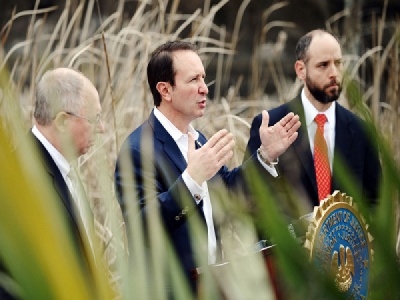
Posted on February 13, 2018
By Dan Boudreaux and David J. Mitchell, The Acadiana Advocate
Louisiana Attorney General Jeff Landry is suing the U.S. Army Corps of Engineers over land loss in the White Lake Wetlands Conservation Area, seeking to force the federal agency to do restoration work in the nearly 72,000-acre state nature preserve in Vermilion Parish.
Filed Friday in U.S. District Court in Lafayette, the suit puts the blame directly on the Corps for land that has disappeared along the Intracoastal Waterway, claiming the agency failed to maintain the channel for decades, which allowed destructive saltwater intrusion into Louisiana wetlands.
First approved by Congress in 1925, the shipping channel was carved out of Louisiana and Texas swamps between New Orleans and Galveston, Texas, through 300-foot servitudes granted by landowners. The channel runs through about 10 to 12 miles of the White Lake preserve, which is south of Gueydan.
Landry said in a news conference Friday that much of the waterway is now wider than the original land corridor.
“What this suit today is about is the Corps of Engineers’ refusal to abide by its own servitude. When the Intracoastal was dug, the Corps was granted a 300-foot servitude. Today, in some places, the channel is over 900 feet,” Landry said.
The canal servitude through the conservation area — which now is managed by the Louisiana Department of Wildlife and Fisheries — was granted to the Corps in 1928 when the area was still private land. The servitude was carried over to the state in 2002 when it took ownership of the huge freshwater marsh, which is known for its waterfowl, shore birds and other wetland species, the lawsuit notes.
Ricky Boyett, a spokesman for the Corps in New Orleans, said Friday the agency can’t comment on pending litigation.
Landry has involved his office in other litigation over the state’s wetland losses. He and Gov. John Bel Edwards have intervened in lawsuits that parish governments have filed claiming oil company drilling, dredging and canal building destroyed wetlands.
The two politicians have suggested in the past that they were working together to try to settle those cases, but Edwards, a Democrat, and Landry, a Republican, have had a testy relationship since both were elected in 2015. Landry — often mentioned as a potential gubernatorial challenger to Edwards in 2019 — has asserted his authority as the state’s top lawyer in a variety of issues, often putting him at odds with legal positions pushed by the governor.
On Friday, Edwards’ office said Landry filed the lawsuit against the Corps without consulting the governor or the state Coastal Protection and Restoration Authority.
“It’s unfortunate that the agency charged with developing strategies for dealing with coastal wetlands was not consulted at all,” the governor’s office said in a statement following Landry’s news conference announcing the suit. “While coastal restoration is a top priority of Gov. Edwards, as evidenced by the significant work we have done over the last two years to expedite projects, we will review the lawsuit once the language is provided to us and determine the best path forward for the state.”
Landry said at the news conference that the Corps’ failure has cost Louisiana thousands of acres, and the lawsuit will hold regulators accountable to the law just like the average citizen would be.
U.S. Rep. Garret Graves, a Baton Rouge Republican, released a statement in support of the suit, noting he was unable to attend the news conference because of the budget debate in Washington, D.C.
“As Americans, owning and enjoying private property is a fundamental Constitutional right. For far too long, this right has been ignored and trampled upon. What’s worse is this damage, destruction and other abusive and illegal actions are being taken by our own federal government through the Corps of Engineers,” Graves said.
The lawsuit will be handled by Couhig Partners, L.L.C., a New Orleans-based law firm.
Both attorney Rob Couhig and Landry added that the state isn’t looking for monetary damages and just wants the Corps to restore the lost land and take appropriate measures to halt further damage along the Intracoastal Waterway.
“We’re not looking for some sort of jackpot justice. What we’re looking for is for the Corps of Engineers to restore the land that has been lost outside the servitude and put into place a mechanism for that servitude to be maintained,” Landry said.
Despite the sweeping language about the state’s wetlands losses offered Friday by Landry, LSU law professor Edward Richards noted that, based on the suit filed, it is a “very narrow claim for this length of canal that goes through the White Lake property” and seeks to restore land on which the canal has encroached.
“Whatever the grand pronouncements, this lawsuit is very geographically limited,” Richards said.
In the news conference, Landry was asked how the new lawsuit squares with his intervention in the litigation by coastal Louisiana parishes against oil companies over land loss. Landry said the majority of the state’s coastal problems were caused by the federal government through the Corps.
“It’s well documented that the Corps of Engineers’ policy is responsible for a vast majority of our Louisiana coastal problems,” Landry said. “Now whether there are other parties that are responsible as well, that’s yet to be determined. … Policy decisions have consequences, and those policy decisions are having consequences here in Louisiana,” Landry said.
Source: The Acadiana AdvocateJeff Landry





